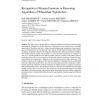Free Online Productivity Tools
i2Speak
i2Symbol
i2OCR
iTex2Img
iWeb2Print
iWeb2Shot
i2Type
iPdf2Split
iPdf2Merge
i2Bopomofo
i2Arabic
i2Style
i2Image
i2PDF
iLatex2Rtf
Sci2ools
INFORMATICALT
2010
2010
Recognition of Human Emotions in Reasoning Algorithms of Wheelchair Type Robots
This paper analyses the possibilities of integrating different technological and knowledge representation techniques for the development of a framework for the remote control of multiple agents such as wheelchair-type robots. Large-scale multi-dimensional recognitions of emotional diagnoses of disabled persons often generate a large amount of multi-dimensional data with complex recognition mechanisms, based on the integration of different knowledge representation techniques and complex inference models. The problem is to reveal the main components of a diagnosis as well as to construct flexible decision making models. Sensors can help record primary data for monitoring objects. However the recognition of abnormal situations, clustering of emotional stages and resolutions for certain types of diagnoses is an oncoming issue for bio-robot constructors. The prediction criteria of the diagnosis of the emotional situations of disabled persons are described using knowledge based model of Petr...
Communications | Disabled Persons | INFORMATICALT 2010 | Knowledge Representation Techniques | Petri Nets |
| Added | 05 Mar 2011 |
| Updated | 05 Mar 2011 |
| Type | Journal |
| Year | 2010 |
| Where | INFORMATICALT |
| Authors | Dale Dzemydiene, Antanas Andrius Bielskis, Arunas Andziulis, Darius Drungilas, Gediminas Gricius |
Comments (0)

